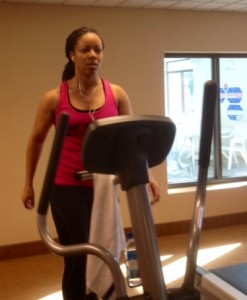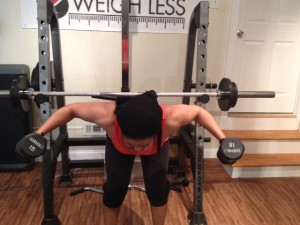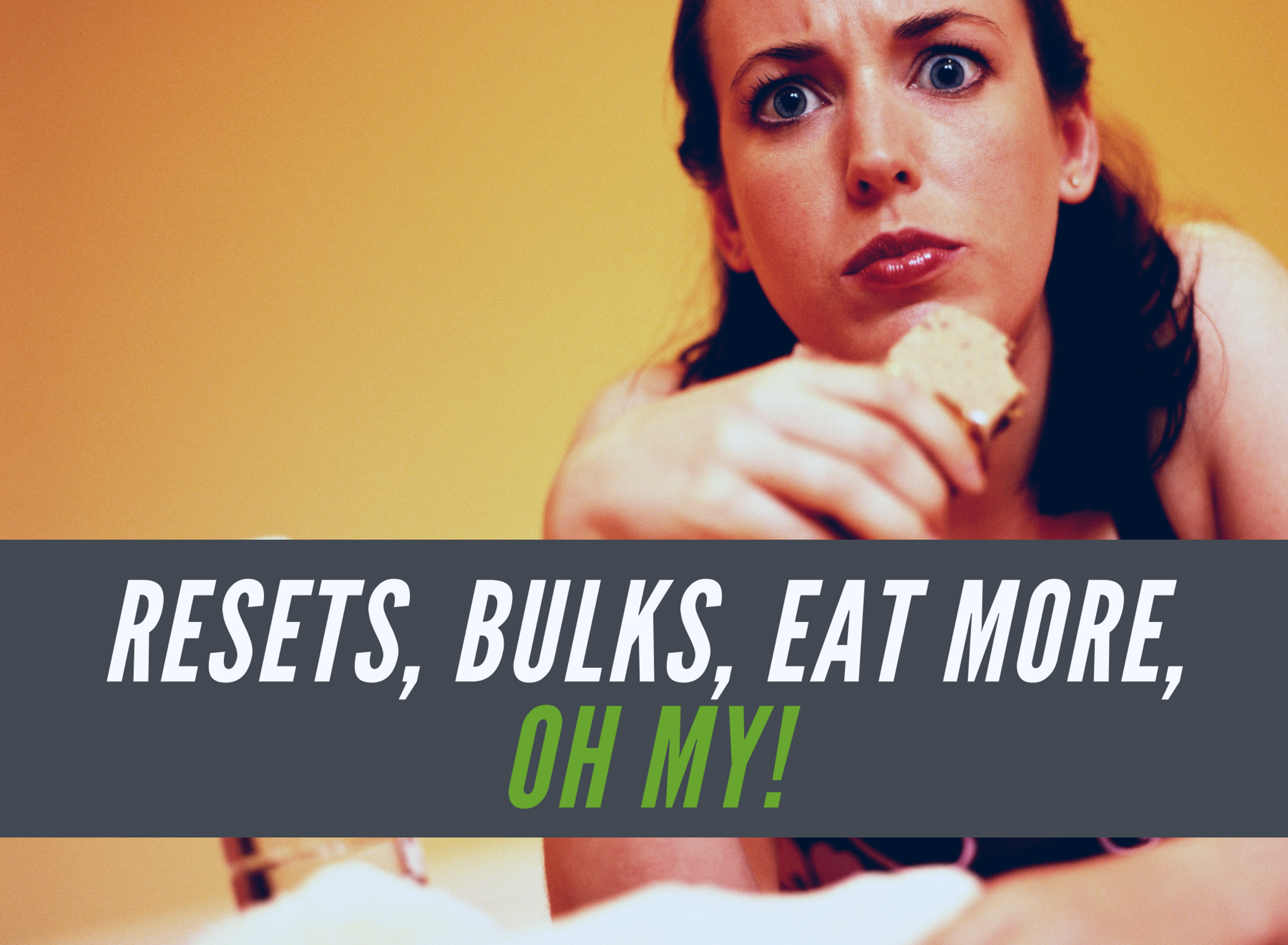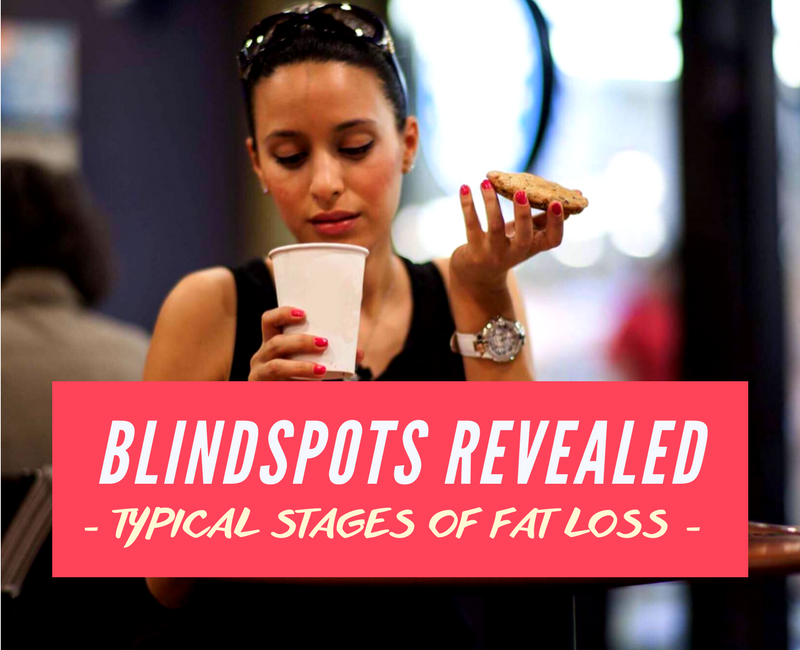Q: I lost around 30lbs very quickly by doing over an hour of cardio/day, 7 days/week, and severely restricting calories. When I hit a plateau, I increased cardio further and decreased cals to lose the last 12lbs. Eventually 15 of those pounds came back. I found out about EM2WL, and began a reset, and I’ve gained a LOT of weight. Is being up 20 pounds ‘normal’? Is it normal to lift and not fit into any clothes? Am I eating too much and that’s why I feel so bloated and puffy? I’m just at a loss and feeling pretty down on myself. I’m right back where I started…
A: As much as I hate to be the messenger…yes, it is normal to be gaining weight during reset. Because you were undereating for so long, it takes a while for your body to regulate (which is why we recommend metabolism resets). When we diet using extreme caloric deficits and excessive cardio, the weight that is lost comes not merely from fat, and water, but also from muscle, joints, tendons, ligaments, and brain tissue. We also deplete our bodies of much needed vitamins and nutrients. So when we increase calories, coming from an extended period of undereating, our bodies will often first retain everything, assuming that this is merely a binge. During this period of retaining, your body is seeking to replenish the nutrient deficit, as well as balance out mineral deficiencies. As noted in the Biology of Human Starvation (see our synopsis), a period of OVERfeeding is often necessary before proper balance is restored. Because most people just starting out on a reset are petrified of eating more, this re-feed period is a bit understated. Many will only eat the bare minimum (TDEE) and often undercut/skew that amount, for fear of gaining. But recall that Dr. Keys made it clear that during a refeed, calories must be in abundance in order to rehabilitate properly. This is why many choose to use their reset as a period of bulking, to purposely overfeed and rebuild lost bone and muscle. This gives their reset purpose, and helps them to have something to focus on other than waiting for the cut.
None of this means that the reset process is exceptionally pleasant, although you will surely notice some unexpected benefits. You will feel bloating and discomfort as you retain water while your body is forced to figure out how to gather the nutrition it needs while digesting larger amounts of food properly. Once your body understands that proper nourishment is a mainstay, it will then look to replenish the areas that have been depleted. The rebuilding process is necessary and essential to your well-being. However, weight gain can be less drastic when food intake is increased slowly, and done for a much longer, realistic, time frame. Rushing the reset is often the cause of unnecessarily high weight gain, causing one to quit early, and results in an unsuccessful cut. Skipping the reset altogether is also a reason why you’ll see many struggle in the beginning of their cut.
You are lifting heavier now, in addition to eating more, which will assist in rebuilding any muscle that has atrophied. Exercises that create strong muscles will also increase bone mass. Healing will always be your body’s primary goal (unfortunately, it doesn’t really care about your physique goals), although some fat loss may be happening simultaneously. As the body begins to rebuild the muscle/bone/brain tissue, etc., this will show as “gain” on the scale. But you will have so many things going on that solely judging by the scale will not give you the full story. This will seem very frustrating at first, but you will still likely notice positive changes in the mirror, pictures, and the tape measure during this time. As the rebuilding slows, you will eventually see scale movement as well.
It is most important to remember that what you are dealing with now, is what you would have dealt with anyway, the minute you tried to eat “normal” again. The fact that you are gaining weight on what should be your maintenance level calories, shows that your metabolism had completely slowed to meet the lower calorie level. This is the point of the reset. This is something that you were bound to experience, regardless. In order to keep losing, you would have kept lowering cals and slowing the metabolism further, constantly recreating your maintenance level. This means that anytime your calorie intake exceeded this level, you would gain.
So for some, the first 4-6 weeks or so may bring gain and then a gradual release as the body gains trust. But for those who have drastically undereaten for a length of time, this process can take longer. This is especially true if someone needed a reset, yet refrained from taking one (the body will attempt it’s own reset by simply resetting to the cut level calories being given). We must always remember that when we chose drastic measures to lose weight, there will be consequences. Losing the wrong “type” of weight, just for the sake of seeing the scale move, tears our body down and causes it to lose trust in us. A body that does not trust us is left to it’s own devices to nurture itself, deciding what will stay (fat) and what can go (muscle, etc). It also means that the loss was not true. When a loss is not true, it is essentially temporary, and we can typically expect to gain it all back…and more.
The #1 reason that weight gain during a metabolism reset is surprising for most of us, is because we forget that it’s only ONE phase of the journey. The Reset Phase is about healing, not fat loss (that’s a whole ‘nother phase!). For more info on the 5 phases click here.
Discover more from Eat More 2 Weigh Less
Subscribe to get the latest posts sent to your email.





Hi I’ve gained 6lbs in 10 weeks of a reset, do I have to up my tdee at this new weight or do I stick with the calories I started out on 10 weeks ago?
In the end it doesnt matter too much, the caloric difference is minute. Most people use TDEE as a guideline. some days you might be under a bit, and other days over.. so the minimal difference with the weight gain won’t change much. Hope this helps
Can you do this and lose weight still? I have wedding in two months, the idea of gaining ten lbs is not realistic as my dress would not fit.
Hey Lindsey,
You will lose fat once you were cutting, but not during the reset. The reset is about healing your metabolism first, so that you can resume a healthier fat loss lifestyle. If you have been undereating for a long time and know that you need to a reset, I would honestly wait until after the wedding. The stress alone of worrying about “will I gain” can spike those cortisol levels like crazy and then CAUSE you to gain. You need to be in a good headspace to do a metabolism reset, and it needs to not be rushed. So I would wait until after the stress of the wedding planning is over, so that you can relax into this process. You might not end up gaining at all, but it’s better safe than sorry in this case. Enjoy your special day, and your honeymoon ;)… and come back ready to start a new life in every sense of the word.
~Kiki
PS. Be sure to continue reading up on everything that you can about the reset in the meantime, so that you can be fully prepared for what to expect. Sign up for our free “quick start guide” (should be a sign up button at the top of this page), and read/bookmark our Metabolism Reset Guide here: https://eatmore2weighless.com/the-metabolism-reset-guide/. This journey will change your life, so spend the next few months diving into all of the resources we have here & getting ready for your new life!
What an insightful article, I know it’s slightly old but I’ve got a few things I was wondering about. I’ll try and keep it short but last year I went on a ‘diet’ and lost 50lbs and developed atypical anorexia with no binging or purging. I started eating this year at 1800 calories and was at 2000 calories for about 4 of the six months of this year with no retreats or relapses, I am highly active and take about 160000 steps daily and started eating at my tdee of 2500 calories, I gained on 2000 calories steadily at 2kg per month and so I am still gaining and was never underweight and have reached 142lbs at 5’3. The gain is still going on and I am going to stick it through and carry on but was wondering for how I need to eat at tdee for and is my activity level correct? Thank you
Hi! My tdee is somewhere between 2000 and 2300. I have been trying to eat 2180 and most days I do not get up there, especially as a vegetarian. I have gained over 10 lbs over about two months, but before that when I was eating very little (I would get busy and honestly forget to eat), I actually had gained about 10 pounds, so I’m up 20 from my normal.
I have been gaining these last 10 lbs very slowly, and it makes me think I may be above my tdee, but then again I haven’t been getting my tdee in consistently, so I’m not sure where to go from here. I don’t want to keep gaining but I also don’t want to give up.
Thank you in advance!
Hi Anita!
If you are still gaining, I would sit tight at the current cal level, w/no further increases OR decreases). I doubt that you are above your true TDEE, but your body does not realize that just yet. Remember that when we first come to this lifestyle our body has adapted to the lower cals and pretty much anything above that is deemed as being “over” TDEE :(. (Which is why you were starting to gain before the process even started). I would take the time at your current cal level to try to balance out your macros. I know this is always a huge factor for my vegan/vegetarian clients. Your carb intake has likely increased dramatically with the rise in cals, so your body is in a water retentive frenzy trying to figure things out. Don’t give up. Try to get that protein intake up to 30% or more (or at least 1g/lb of body weight). It will likely make a big difference. Your fiber is probably pretty good already, so if you tweak the protein and hit it consistently, you’ll probably notice the gain subside. If you are doing a metabolism reset, then you can go ahead and increase cals to the next level – keeping the protein on target. Then allow your body to simply heal when you arrive at that final level. When it’s time to cut, you will enjoy a metabolism that actually responds and treats you with the respect you’ve given it. ;). Don’t underestimate the joy of having a flourishing metabolism again. It’s totally worth it!
~Kiki
Hi Kiki!
I have had such a hard time meeting calorie requirements. I don’t want to rely on clif bars but seriously I keep turning to them for protein and even energy. I know I need to eat more but physically I’m having a tough time doing it. I’m considering making smoothies with fat in them just to get my calories in more easily but I don’t know what to do. My appetite is sometimes high but when I eat I can’t really eat more than a little at a time. No health issues thank goodness, but I don’t know what else to do. I maintained my weight for months at a few hundred calories higher than before, in the 1800 range, but it’s still hard to even get my bmr of 1538. Please advise!
And thank you so much for your encouragement from before!
Sincerely,
Jennifer (it said Anita before!)
Hi Jennifer!
It’s not uncommon for many of us to resort to adding more fat in the beginning stages to help with the calorie increases. Many of us even have to add in shakes or bars because we’re just not that hungry at first. Adding some fish oil (liquid is best – I like the flavored blends), coconut oil, or nut butters is often a go-to for shake add-ins because fats increase the cals most easily. Once your body gets accustomed to eating enough, your appetite does gradually come back (it’s actually one of the phases described in your starter kit having ravaging hunger after the phase of no hunger, LOL). But eventually it will all regulate. So don’t be too concerned that what you do in the beginning is what you’ll be stuck doing forever, because when your hunger regulates, you’ll likely want a wider variety. But for now, adding a higher-fat smoothie could be just what you need.
Have you tried setting a timer? For many of us that is super helpful in the beginning to help re-train our hunger cues. Try setting the time for every 3 hours or so and just having a bite of something. As much as you can handle. Then set the timer for another 3 hours, and eat again. Typically this doesn’t take more than a week or two…your body will start to remind you just before the timer even goes off that it’s time to eat again. When you get to the point that your body is telling you that you’re hungry in regular intervals – and you’re able to eat in sufficient amounts – you can ditch the timer and eat at intervals that suit you :)
Hope that helps! Don’t worry that it doesn’t happen overnight. For many of us, it takes a while for our brain/stomach connection, and for our bodies to trust us and know that it really is ok to be hungry…and to respond to that hunger.
Keep me posted on your progress!!
~Kiki
I love reading all these blog posts! They are so informative! A lot of information to take it, but also a lot of hope that will eventually pay off. Trusting the process. Im going into week 2 of EM2WL and have ditched the scale. I hope to stick with it!
I don’t know if this thread is too old or not, but about 4 months ago i was eaeting very very little to lose weight, and after a month i lost 10 pounds, then started eating more again. At first i lost another 3 pounds in the 2 weeks that followed and i continued to slowly increase my calories. But after that i gained 7! pounds in 1 week, at first i thought it was just water weight and i tried waiting it out, but it has been 6 weeks now and an extra 5 pounds! This is so heartbreaking that i am not losing weight! i workout 6 days a week for 1-2 hours with a weight:cardio ratio of 3:2. I just don’t understand! none of my clothes are fitting anymore and i am so uncomfortable. I feel like i am still gaining even though i am doing everything i can to lose. Can you please help? I know its not water weight, the fat has spread throughout my entire body; legs, arms, “saddlebags”.
Hi Kai! Don’t be too hard on yourself. What you’re experiencing is common when weight is lost due to lower cals. As soon as we go back to normal eating, we regain the weight plus more. This is hard to accept, but it’s all the more reason why you want to stay on the right path and lose the fat the right way this time around. How much were you eating before compared to now? Is it likely that you still aren’t eating enough for the amount of work that you’re doing? And what types of workouts are you doing? Steady state cardio? HIIT? Circuits? 6 days/week is a lot. Sometimes the “extra” could simply be from not giving yourself enough downtime between workouts. Your body part will swell after working it, in order to repair. But if it’s not getting enough repair time, then it will continue to swell. Also, have you taken any pictures to see if the gain is noticeable? The scale is extremely finicky when working out (especially with weights) so be sure to use ALL methods of tracking your progress.
Great article, but I have some questions. I completed my reset (2300cals at TDEE I think?) 2 weeks ago and am now on my cut (1800cals) I lift heavy x3 p/w and walk for 30 minutes all rest days. But I haven’t lost any weight and its really worrying me. I’ve been gaining for over a year now, and my reset went for 3 months, the scale says I may have lose 1kg but I am suspecting now that it was only water weight or bloat weight, so now I have no idea if I should continue the cut or what :/
Hi Alexandra,
Did you gain weight during the reset? If so, did your weight stabilize? Or did you just stop after a certain period of time? Did you take pics and measurements at the beginning of cut? How do they compare to now? Although 2 weeks is not really enough time to judge progress, stabilizing before moving on to cut is critical, and taking pics/measurements along the way are essential. Body composition changes will show in those areas first. The scale is just one tool of many, and one of the most finicky when you are lifting weights. Scale progress will never be completely linear, so be sure to use all of the tools in your measuring arsenal ;)
Thank you for replying, before my cut I did gain weight, quite a lot. And I think I did stabilise a week before I cut, but I’m not 100% sure, what should I do now if it didn’t stabilise? And yes I have taken measurements and my weight before the cut, and they are still the same, unfortunately. Should I continue to eat 1800cals for 4 weeks and then up it to 2300cals for 1 week? Or just go back up to 2300cals basically straight away? I’m just so confused as I had purposely done 12 weeks of the reset so nothing like this does happen, yet here I am :(
This is a great article! Thank you! I am now reading more articles on your site. :)
I started overfeeding over a year ago. I overate LOTS of food suddenly, instead of increasing my calories and carbs slowly. After 3-4 months, I got to a point where I can eat a ton of food and not gain weight.
But I can’t get rid of the bloat I gained..and I’ve got pretty bad water retention. I’ve never had it before I went through my refeeding process. And bloat is uncomfortable.
Can bloat last this long? Although I’m eating the calories I need, I DO have chronic stress in my life. Maybe that could be contributing or maybe I have a food intolerance. Or maybe moving and lifting on a consistent basis will help.
Thank you again for the article!
Hey Beth, so happy you found us! Bloat can last a long time for various reasons. All those that you listed are valid, you may also want to check into what your overall sodium levels have been over this time. It it’s mostly belly bloat, you may need to increase protein. It’s hard to say, not knowing your entire situation or seeing your food diary, but I’d definitely look into all of the above (one at a time – to find a sure culprit). I’d begin with the stress, then protein, and see how your body responds. If still bloated, I’d then double check sodium, & seek to perform an elimination diet of common offenders (wheat, gluten, dairy, soy, etc)
Thank you so much! :) This is an awesome site!
I am bloated everywhere. But my stomach is also very big.
I’m working on tackling stress first. And getting more sleep. Then I’ll go from there.
The ideas about protein and sodium are wonderful! I probably need a bit more protein in my diet right now and will up it a little.
Thank you again.